How Many Title Defenses Does GGG Have? It’s Complicated
In the wake of Gennady Golovkin’s return to knockout form last May, there was much fanfare regarding his purported achievement of matching Bernard Hopkins’ record of 20 consecutive defenses of the world middleweight championship. Thus, assuming he is victorious this Saturday versus Saul “Canelo” Alvarez, Golovkin would then set a new all-time record in the 160 pound division. Well, sort of. As the saying goes in love, life and boxing trivia: “It’s complicated.”
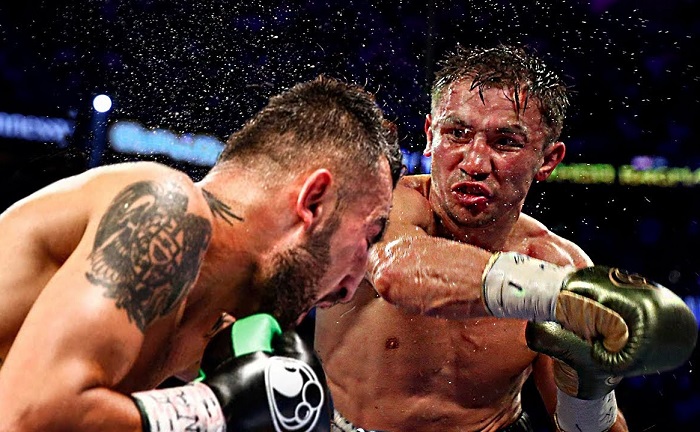
Before getting to the nitty-gritty of said complications, first let’s deal with a big elephant in the room. While everyone seems to be distracted debating the historical merit of the World Boxing Association’s assortment of “world title” belts (more on that later), there appears to be a lack of sound bookkeeping when it comes to the great Bernard Hopkins’ fight ledger. The record set by Hopkins, as often reported, is 20 straight title defenses. Except it isn’t really, because he in fact did not successfully defend his middleweight championship 20 times.
The reason why is simple. In August of 1998 Hopkins defended his IBF middleweight title for the ninth time in Las Vegas against Robert Allen. But in a freak incident in the fourth round, Hopkins was pushed out of the ring by referee Mills Lane and subsequently injured. With Hopkins unable to continue, the match was declared a “No Contest.” And unlike a draw, a “No Contest” does not count as a successful defense for the champion because there is no “result” to speak of, in any meaningful sense. The champion keeps his title, but does not keep it by virtue of gaining any competitive advantage in the contest, since there, in fact, was “No Contest.”
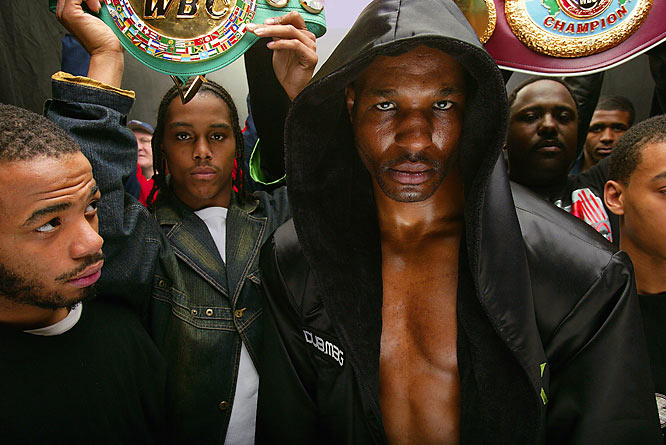
Why, in that instance, should Hopkins be given any credit over Allen? If Hopkins made a “successful defence,” conversely that should mean Allen made a “failed challenge.” But in fact, he did not fail. He had his opportunity to find out whether he would succeed or fail taken away from him by a strange quirk of fate. And since neither fighter bested the other in accordance with the rules of boxing, neither should be credited with a win or a loss on their record – which is surely the whole point of having a “No Contest” ruling in the first place.
Even assuming we go with the flawed but commonly accepted record number of defenses as 20, the question then arises about whether Hopkins’ title run is really commensurate with past middleweight reigns. The problem is that, unlike with great fighters from eras of the past, for the majority of Hopkins’ reign, up to three other men walked the planet with a claim to being “the middleweight champion of the world.” It wasn’t until Hopkins defeated Felix Trinidad in 2001, thus unifying the IBF, WBC and WBA titles, that he became universally recognized as the lineal and undisputed middleweight champion of the world.
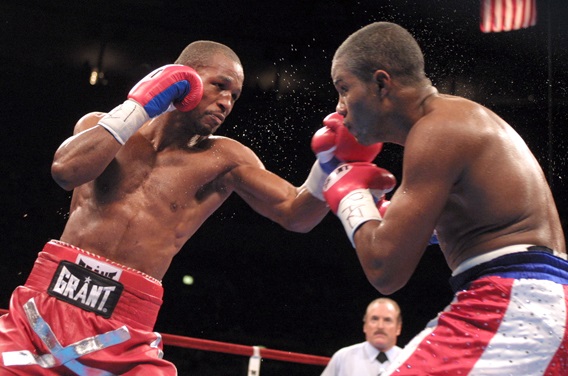
Then, in 2004 Hopkins defeated Oscar De La Hoya, to add the WBO title to his collection and become the really-really-truly-undisputed champion. (You may wonder, if De La Hoya was a legitimate middleweight champion when facing Hopkins in 2004, why wasn’t De La Hoya’s WBO predecessor also considered legit when Hopkins faced Trinidad in 2001? Answer: It’s complicated).
So, depending on whether you count Hopkins’ reign as the middleweight champion beginning in 1995 when he defeated Segundo Mercado, or in 2001 when he beat Felix Trinidad, or in 2004 when he fully unified against De La Hoya – and depending on whether you want to count his “No Contest” against Robert Allen as an actual contest – you can reasonably argue that Hopkins’ true record of defences is either 20, 19, six or one. Still with me? I did say it was complicated.
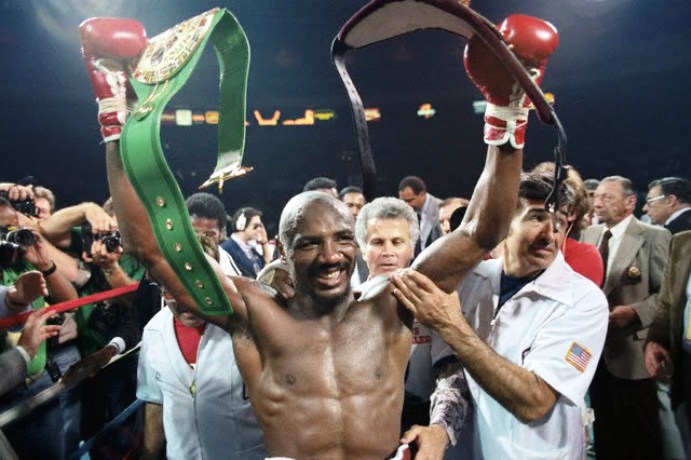
Compare this with the great Marvelous Marvin Hagler, who took the undisputed (WBA & WBC) title in his very first championship win in 1980. Hagler defended those belts 11 times and collected the newly created IBF title along the way, making a total of 12 defences of the lineal crown. Or, better still, compare it to Carlos Monzon, who became the undisputed (WBA & WBC) middleweight champ in 1970. Monzon defended the WBA and lineal crown 14 times, though it should be noted that the WBC stripped Monzon in 1974, but he re-unified the belts two years later.
If you are of a mind to only count Hopkins’ “proper” title reign as beginning with his win against Trinidad – which, considering it came in a tournament specifically designed to crown a supreme champion in the division, seems reasonable – that would place his consecutive number of defenses well behind both of these legends.
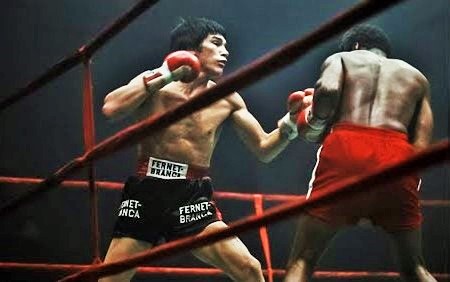
Which brings us back to the issue of Golovkin’s title run. Following his second-round victory over Vanes Martirosyan, Tom Loeffler, Golovkin’s promoter, tweeted that: “GGG tied the all-time record for Middleweight Title defenses last Saturday” – a claim many fans and news outlets have taken and run with.
But more discerning boxing fans have pointed out that not only is Golovkin’s reign tainted by the fact that other champions from rival organisations also held a claim to the middleweight throne during most of that time (as with Hopkins), for a significant period he also faced the absurdity of having a rival champion from within his own organisation. This ridiculous situation is thanks to the WBA, who decided they would make things even more complicated by recognizing both a “regular” and a “super” world champion for each weight class (not forgetting the occasional “interim” champion as well). Naturally, we await the introduction of the WBA super-duper champion with bated breath.
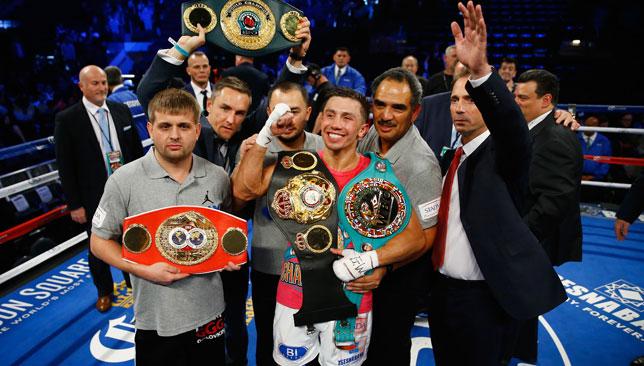
When Golovkin first captured the WBA’s “interim” version of the middleweight title in 2010, Felix Sturm was already recognized as their “super” champion. Sturm lost his super title to Daniel Geale in 2012 (who promptly vacated the belt), but it wasn’t for another two years that Golovkin was finally elevated to the WBA’s super championship status. In other words, Golovkin’s first 11 “world” title victories were not even recognized as the highest form of world honours by his own governing body, never mind the wider boxing establishment.
As Golovkin’s quest for the undisputed title gathered steam, he picked up the WBC’s interim belt (whatever that means) in 2014 and defeated IBF champ David Lemieux the following year. Unfortunately, despite Golovkin being almost universally regarded as the best in the division at this point, the “full” WBC champion (whatever that means) and the lineal champion was Miguel Cotto and he was clearly in no hurry to face the marauding Kazakh. And with the WBC reluctant to enforce a fight between them, Golovkin had to wait a further year before finally being upgraded to the WBC’s full title status, making him WBA, IBF and WBC champion. By this point though, Golovkin was 16 defences into his reign – two more than Hopkins when he unified the same three belts.
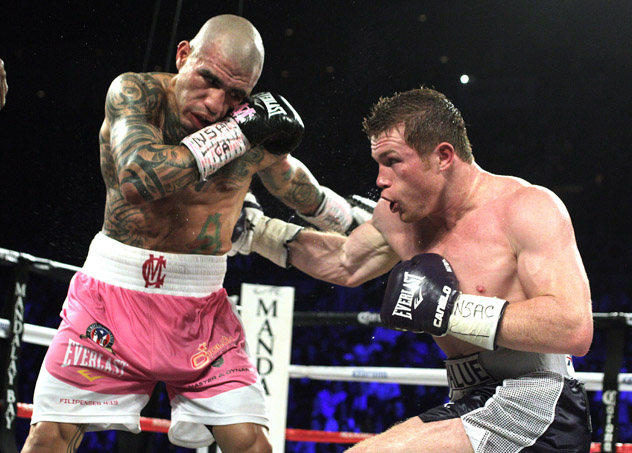
And if all that wasn’t complicated enough, there’s also the small matter of the more prestigious lineal and undisputed championships – both of which, to this day, GGG has still not laid his hands on. Britain’s Billy Joe Saunders holds the rival WBO strap, thus preventing a clean-sweep of the Big Four belts for Golovkin. And Saul Alvarez earned lineal championship status in 2015, and technically still holds recognition as the “man-who-beat-the-man” in the division, having never officially lost that title in the ring.
Many will argue that Alvarez, who took over the lineage that stretches through Cotto, Sergio Martinez, Kelly Pavlik and Jermain Taylor all the way back to Hopkins, is undeserving of the title. And there is some merit to this view: Canelo won and then defended the title in fights contracted at 155 pounds, not 160, then continued the trend set by Cotto and Martinez by refusing to face Golovkin for two whole years. When they finally did meet, only a controversial draw allowed Canelo to retain his status. The fact remains though that Gennady Golovkin has never actually won the lineal title – the same one held by Messrs. Hopkins, Hagler and Monzon – regardless of what politics are to blame.
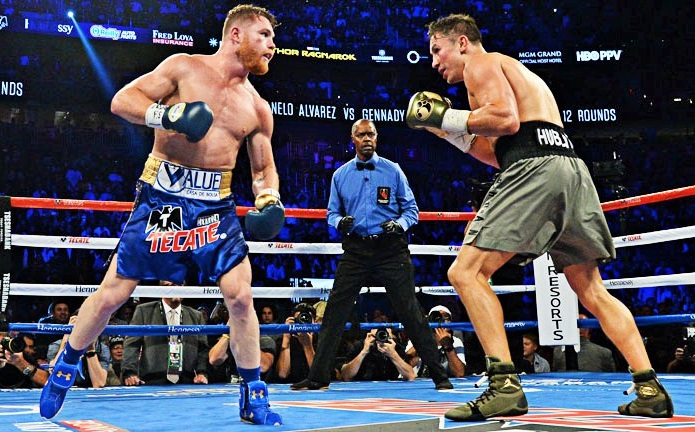
Golovkin himself was more than happy to invite comparisons between his own championship achievements and those of Bernard Hopkins, telling reporters prior to his last fight: “if you check Bernard’s opponents probably you understand that my record is much bigger, is much stronger.” The quality of their respective opposition is another debate for another time, but statistically speaking, Hopkins can justifiably point out that when it comes to the lineal and undisputed middleweight title, GGG is not even a member of the club yet.
Once upon a time, when Hopkins was still the ruling middleweight champion of the world, I read an interview where he said, and I paraphrase from memory, “One day I’ll be the answer to a trivia question: ‘Who made the most successful defenses of the middleweight title?’” But the fact is that question will never be part of any trivia game. Why? Because at this point no one really knows the correct answer. As you can see, it’s just too complicated. — Matt O’Brien

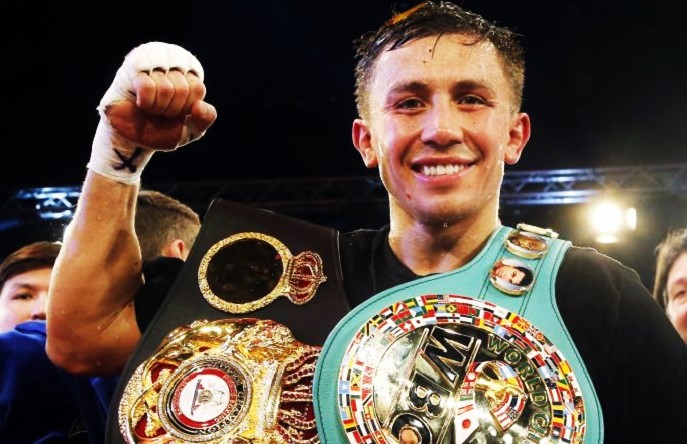

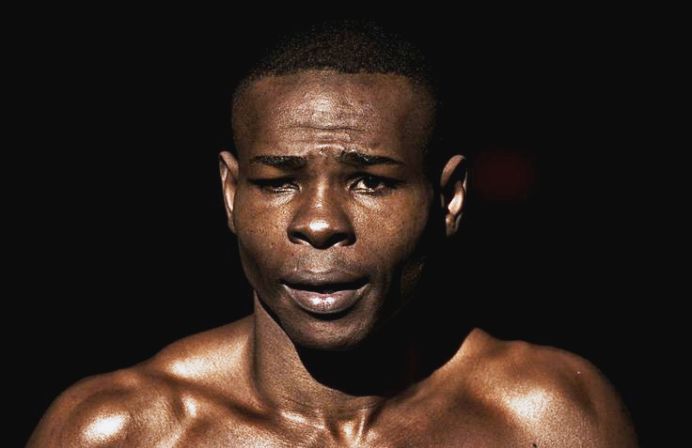
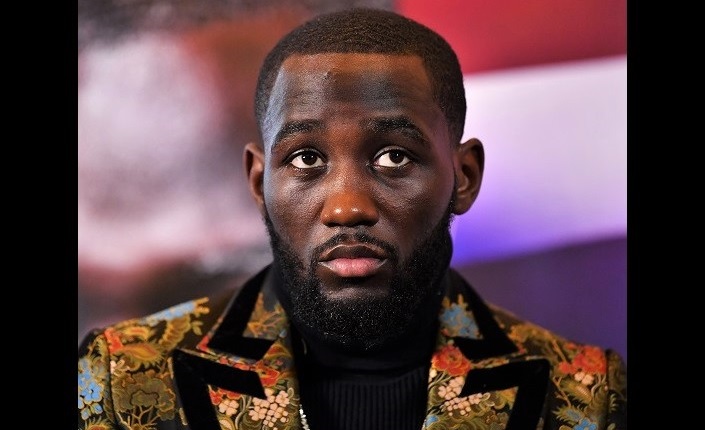

You need to go back to boxing school to get your facts right. Had Hopkins fought Golovkin in his prime it would be no contest. Hopkins was one of the greatest middleweights of all time and you need to stop trying to bring him down.
You seem to have missed the point of the article. No opinion was offered about who would win a hypothetical match-up between Hopkins and Golovkin. The facts regarding each man’s title reign speak to the mess caused by the sanctioning bodies, and was not a criticism of the fighters. Happy to be corrected if any of the factual claims are inaccurate.